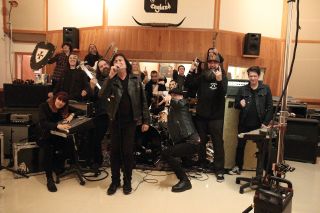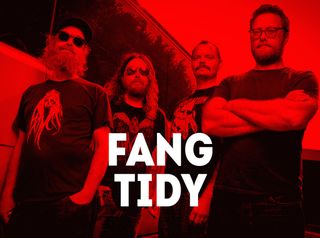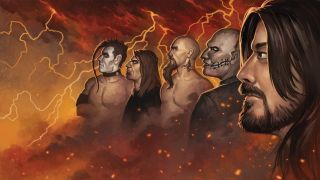In the long corridor at Dave Grohl’s Studio 606 in Los Angeles, Corrosion Of Conformity drummer Reed Mullin is quietly losing his shit, unsure what to say. At the other end of the corridor stands 64-year-old American punk rock legend Lee Ving, happily recalling the time that his band Fear were banned for life from Saturday Night Live. “Dude!” beams Reed, as if we haven’t noticed. “It’s Lee Ving!”
Behind us, Alkaline Trio’s Matt Skiba is taking selfies with My Ruin’s Tairrie B and Mick Murphy, while Fireball Ministry’s Jim Rota chats to Samhain drummer London May. In all, there are about 15 bandmembers here, all gathered for a photoshoot and to hear the final mix of their new album, Greatest Hits Vol. 1 , which is blasting from the studio. Currently, we’re listening to Jello Biafra’s blistering rendition of the John Cleese poem Ode To Sean Hannity. And it’s not every day you get to hear Monty Python-approved punk rock!
Make no mistake, this is no ordinary album playback, where you’ll be stuffed into a joyless room with some humourless journalists, or, worse still, have to listen to the record in front of the band, hoping to nod in all the right places. Instead, Reed hands out beers and there’s a general mingling about, and not a little confusion about who’s actually in the band, as some of them have never actually met before.
This is no ordinary band, either. In all, there are 35 members (and counting), including some of the biggest names in rock, such as Dave Grohl, Corey Taylor, Randy Blythe, Neil Fallon, Doyle Von Frankenstein and Nick Oliveri. The band is called Teenage Time Killers, a side-project to eclipse all others, and perhaps we should try to explain how it all happened. This, after all, was not the plan./o:p
Our story begins about 30 years ago, when a young Reed Mullin was putting on punk shows in his home town of Raleigh, North Carolina, and putting out records on his own independent label. Among those he signed were a Washington DC band called Dain Bramage, whose lineup included none other than future Foo Fighter Dave Grohl. “He was a big COC fan,” says Reed, “still is, and we’d played with his band. I remember seeing him at the 9.30 Club in Washington DC, and I had this little label, so I put his band out, and 30 years later he’s a big rock star or whatever. We’ve been friends for years and beers, so he let us do an album here [2012’s Corrosion Of Conformity], and I became friends with the head engineer, this guy named Lou [John ‘Lou’ Lousteau]. Lou was like, ‘When we have some free time at the studio, you’ve gotta come out and do some hardcore songs.’” Needless to say, it sounded like a cool idea and, good to his word, a year later Lou called to say they had a free week in the studio. By this time Reed had written some material, including the aforementioned adaptation of the Cleese poem, and he called up punk icon Jello Biafra to see if he wanted to sing it. “So I flew out and went into 606 with Lou and his buddy Mick [Murphy],” continues Reed. “And instead of doing five tracks we did 12. Then I’m at the airport going home and I see this guy walking past as I’m going to my gate, wearing sunglasses like he’s all hungover or something, and he’s wearing a Corrosion Of Conformity t-shirt. So when I walked by, I was like, ‘Hey, man, nice shirt!’ like a dork. He pulled his glasses down and replied, ‘Reed?’ And it was Randy Blythe from Lamb Of God! I told him what I was doing and that I had Biafra singing, and he was like, ‘I wanna be on it!’ So it went from being five songs, with Jello singing a song, to being 12 songs with Jello and Randy fronting the tracks.” From there, it’s safe to say that things may have spiralled out of control. Dave Grohl somehow got wind and wanted to be on the record, and was swiftly followed by Pat Smear, Lee Ving, Minor Threat and Bad Religion guitarist Brian Baker and Tommy Victor of Prong, and five tracks became 21. “There’s some pretty big names,” grins Reed. “But pretty much everybody on the list, I’ve known forever. It kind of reminds me of the old days when I used to put on punk rock shows in Raleigh, and I’d get my friends from Richmond or DC to come and play a show. The only guy I didn’t know on this was Corey Taylor, but Lou from the studio is friends with him, and he was like, ‘I’ll do it next week!’” Surprisingly, Reed says that juggling 35 musicians for the recording process was relatively easy. In the old days it was all analogue tape, and people would have to go to the studio in person, but now there’s Pro-tools and the internet, so Vic Bondi from Articles Of Faith did his vocal tracks in his home studio, as did Neil Fallon from Clutch, and Mike Williams from Eyehategod [we told you it was a big roll-call]. It’s a far cry from the standard story of a regular band jamming in a rehearsal space (which would have been logistically impossible), but Reed insists that this didn’t mute the exchange of ideas. “I don’t think so,” he offers, “because the vast majority of us have known each other for so long, and we all went through the same experiences in the punk rock days. But I know what you mean, it’s certainly different from the old days where people would gather and write songs, like, ‘Hey, what do you think of this?’ I wish it could’ve been that way, but a lot of the vocal tracks were done at 606, just when people dropped by.

This much is clear from the first playback; Greatest Hits Vol. 1 is no fucking joke, either musically or lyrically. And Reed is not far wrong when he compares the record to the classic 1981 compilation Let Them Eat Jellybeans, which featured such legends as Black Flack, Dead Kennedys, Flipper and Bad Brains.
“This album is kinda like that,” he says. “It has a lot of different flavours of punk rock and weird music. And the same goes for the lyrics: there’s a song called Dead Hand, which is straight up Protest And Survive by Discharge… I totally ripped that off! The Dead Hand was this system that the Soviets had in place, when the Cold War was going on, where even if everybody over there was dead, they’d still send their entire arsenal at us. It was called The Dead Hand, but I wrote a song about it that sounds a lot like Discharge. It’s pretty varied in terms of a lot of the different styles of punk; there’s some American hardcore, some British-sounding GBH/Discharge kind of stuff, but then the one that Corey Taylor sings sounds like 1983 thrash metal or something, with an Iron Maiden intro! Man, there’s 21 songs, so it’s kind of hard to say, but there’s so many different flavours. There’s some stuff that sounds like the New York Heartbreakers… all kinds of stuff.”
The name of the band, Teenage Time Killers, in case you’re wondering, was taken from a song by legendary anarchist punk band Rudimentary Peni, a song that’s covered on the album, with teenager Trenton Rogers on vocals. Reed even wanted to get Peni’s Nick Blinko to do the sleeve artwork, but was told “not to hold [his] breath!” The album title, Greatest Hits Vol. 1, meanwhile, was lovingly pilfered from West Ham hooligans the Cockney Rejects. In a way, it’s a knowing nod to the fact that punk rock still doesn’t quite get the respect it deserves from the metal community, still the awkward cousin whose name is a four-letter word. Without Discharge or GBH, there would be no thrash metal, simple as that. Funnily enough, Reed agrees.
“No shit! I couldn’t agree more,” he exclaims. It’s been said, not without some truth, that unk was the best thing to happen to metal, and that metal was the worst thing that happened to punk. “ That couldn’t be more true!” agrees Reed, once more. It’s perhaps fitting, then, that Teenage Time Killer goes some way to redress that balance. It’s only fair, since COC were one of the first to cross from punk to metal without sucking!
“Yeah, from the get go we were into Black Sabbath, but we couldn’t really play Sabbath,” laughs Reed. “One of our songs, Redneck, was really just Sympton Of The Universe. We were always into that, but more for the music. With the exception of Sabbath who always had good lyrics; heavy metal, for the most part, had ridiculous lyrics.”
But we digress. You’ll hear the album soon enough, and already there’s talk of a follow- up, a Greatest Hits Vol. 2. Is Reed ready for another round? Who does he have in mind for the sequel?
“We’ve definitely gotta get some English fuckers,” grins Reed. “Is [UK Subs frontman] Charlie Harper still alive? I think we’ll definitely do another one, as this album was too much fun. Even though there wasn’t a lot of time for us in the studio, it was enough to be a totally cool experience.”
All of which leads to the inevitable, and probably stupid, question… It’s always frustrating when awesome side-projects come together and no one gets to see them live. What are the chances of seeing Teenage Time Killer, given the spiderweb of commitments its members have to adhere to?
“Well, I guess the core members are myself, Mick and Lou,” says Reed, “But I would like to take this out on the road. Maybe we could do a show in LA or New York with as many of the people as we can get together. I can easily see us doing a little tour and a couple of big shows, but some of the bigger-name folks are kinda busy right now. Corey wanted to be here for the photoshoot, but he’s on the road, and Neil from Clutch wanted to be here.”
Perhaps it would work if you were all playing the same festival, like Download or something? Hint, hint…
“Actually,” grins Reed, already ahead of the curve, “we were thinking it might be cool to get as many of the bands who are on there and do a festival of our own later in the year. You want another beer?” Fuck yes, on both counts!
GREATEST HITS VOL. 1 LANDS LATER THIS YEAR VIA RISE./o:p
*NOTE: Despite early rumours, Doyle is yet to be confirmed for this project.

RED FANG’S AARON BEAM ON TAKING PART IN THE SUPERGROUP TO END ALL SUPERGROUPS
So how did you get involved in all this, then?
“My friend who was a guitar tech for Foo Fighters told me about it, as it was happening in Dave Grohl’s studio. Pepper Keenan was originally going to do vocals on one track but for whatever reason he couldn’t do it, and my name came up to Reed. So, I got talking to Lou about it!”
What’s your contribution like?
“It was a challenge. The track is pretty weird; it’s short but has a lot of changes, so it took me a while to work out what I should do. When I was in Los Angeles for the shoot, Reed said something that totally helped put it all into place. He said that track reminded him of Voivod, and he soon as he said that I was like, ‘Ahhhh!’ Now, that track totally recalls Voivod to me!”
There seems to be something of a punk rock ethic running through the way this has all come together. Is that something you find affinity with?
“Oh, yeah. It was totally about the ethos of, ‘Fuck the rules!’ To me, the core about what punk is is that there aren’t any rules about sounds of style, it’s just about being able to do whatever you want.”
If they were to put on a tour or festival to play some of these songs live, would you want to be involved?
“For sure! Actually, Reed was talking about how we could get creative to turn it into a live thing. There are, like, 30 musicians involved, so we couldn’t do a tour, but if it was a festival or something, then I’d definitely want to get involved in that. Hanging with people like Tommy Victor was such an honour – I first saw Prong in 1989 with Soundgarden, so I’d be there in a second!/o:p


